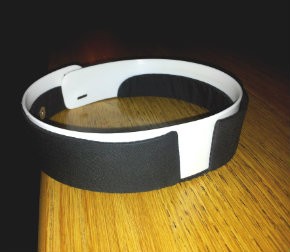Embracing the collar

"What's with the collar?” asked a UCC colleague. “Did you lose a bet?”
I smiled and explained that this was my Lenten discipline: wearing a collar for 40 days.
"You've got to be joking! Whatever possessed you?"
It started out as a dare of sorts. Last fall, I mentioned to an Episcopalian friend that I never wore a collar. He said, "I dare you to try it. You can't hide in a collar." He had a point: it's easy to hide my vocation when I'm dressed like everyone else. And I'm not above using that anonymity to weasel out of situations that are uncomfortable or inconvenient.
A wise seminary professor once said, "If you tell people you're a minister, they will either treat you as their personal confessor and unburden their souls or they will hold you personally accountable for every bad experience they've had with organized religion. Either way, you lose." I took his counsel to heart. Consequently, if you sit next to me on a plane and ask me what I do, I'll say I'm a grant evaluator. That usually stops the conversation cold. Anonymity is my friend.
Yet I regularly encourage my parishioners to take their faith into everyday life. "Being Christian is not a spectator sport! Let your light shine!" I chirpily declare.
Furthermore, I believe that Christian theology is the stuff of everyday life. Theology should be nimble and robust and life-giving, not a dusty subject on a book shelf. Part of my role as a minister (as I see it) is to teach others how to make theological sense of their lives and to prepare them to respond—in the moment—as people of faith. As 1 Peter says, "But in your hearts sanctify Christ as Lord. Always be ready to make your defense to anyone who demands from you an accounting for the hope that is in you.”
So why did I hesitate to be visually identified as a minister?
Part of the reason is that it's so much fun unveiling my vocation to unsuspecting people. Like the time I was seated next to a strange woman at a dinner party in England. She was a couple of drinks to the good and spent much of the evening loudly regaling the entire table with bawdy stories of her sexual conquests. After a particularly ripe tale involving red wine and Viagra, she turned to me and out of the blue asked what I did for a living. "I'm a minister," I said.
"You work for the government?" she asked, confused.
"No, I work for Jesus Christ," I said cheerily, enjoying the blanched and embarrassed look on her face. Suddenly, she remembered she had something to do in the kitchen.
Such a priceless moment would be impossible in a clergy shirt. Ask anyone who's worn a collar—it dampens the conversation; people are careful around you. Even a woman in my Bible study said, "Your collar makes me feel like I have to be on my best behavior, like my teacher is watching or something!"
But someone is watching. Always. In the Christian church, we proclaim that God in the Spirit is ever-present. We live coram deo—ever before God. If the sight of a clergy collar causes you to behave better, then maybe you should have been behaving better all along. Just a thought.
And if seeing me in a collar gives even one person a sudden awareness that God is present in everyday life, then it's worth all the trouble. And while this collar says many things, the first thing it says is "Here is a follower of Jesus Christ." So I guess I may not know exactly what possessed me, but I do know who.





